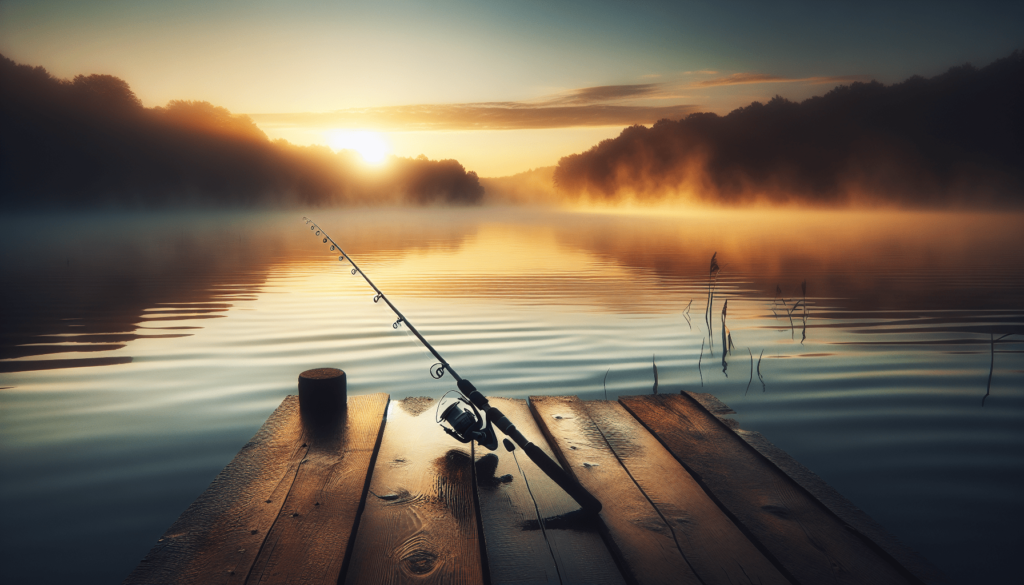
Welcome to our deep dive into the world of fishing myths! In our article “Most Common Fishing Myths Debunked,” we’re excited to tackle some of the most persistent myths that reel us in and cast a shadow over our fishing adventures. Together, we’ll sift through tales of old, from the belief that fish only bite at dawn to the myth that expensive gear catches more fish. By the end of this journey, we’ll be equipped with the knowledge to enjoy our time on the water with confidence and clarity. Let’s set sail and uncover the truth behind these fishing legends! Have you ever found yourself wondering whether certain fishing myths are true or just old tales passed down from generations of anglers? Many of us have encountered a boatload of advice when it comes to fishing, some of which sounds too good—or too bizarre—to be true. It’s time to set the record straight and unravel the mysteries behind these common fishing myths. By the end of this article, we’ll all have a clearer understanding of the reality behind these fishing legends.
Most Common Fishing Myths Debunked
Fishing can be a serene escape or a thrilling adventure, depending on how you approach it. Part of that journey often includes sorting through a mix of solid advice and pure fiction. Let’s dive into some of the most common fishing myths and debunk them with evidence and logic.

Myth 1: Fish Don’t Bite On Rainy Days
The Myth
Many believe that fish hunker down during rainy days and that it’s best to stay home when it’s wet outside.
The Reality
Contrary to this popular belief, rainy days can actually be prime fishing opportunities. Rain can cause a drop in water temperature which often brings fish to shallower water in search of food. Moreover, the rain can disturb the water surface, making it more challenging for fish to see anglers and their gear, potentially increasing your chances of a catch.
Table – Fishing Conditions
| Weather Condition | Fish Behavior |
|---|---|
| Sunny | Fish often stay deeper |
| Overcast | Fish are more active, often surface in search for food |
| Rainy | Fish tend to move towards shallower areas |
Myth 2: Bigger Hooks Catch Bigger Fish
The Myth
It’s widely believed that using larger hooks will automatically result in catching larger fish.
The Reality
While it seems logical, this belief is not accurate. Large hooks can sometimes deter fish, reducing your chances of catching anything at all. Match the hook size to the type of fish you’re targeting and the bait you’re presenting. Often, a more appropriately-sized hook will yield better results, regardless of the fish’s size.
Myth 3: Fish Don’t Feel Pain
The Myth
Some anglers think that fish don’t feel pain, making catch-and-release practices less concerning.
The Reality
Recent studies indicate that fish have nerve cells similar to humans and can indeed experience pain. Ethical fishing practices, such as using barbless hooks and handling fish with care, are essential for ensuring the well-being of our aquatic friends.
Myth 4: You Need Expensive Gear To Catch Fish
The Myth
There’s a common misconception that only high-end, costly gear can yield a good catch.
The Reality
While high-quality gear can provide advantages, it’s not a necessity for a successful fishing experience. Many experienced anglers achieve excellent results with moderately priced or even budget-friendly equipment. What matters more is your skill, understanding of fish behavior, and the right technique.
Myth 5: Fish Only Bite Early Morning or Late Evening
The Myth
Many believe that fish are only active during the early morning and late evening, rendering mid-day fishing futile.
The Reality
Though fish are typically more active during these cooler periods, they do bite throughout the day—if you know where to find them. Changes in water temperature, feeding patterns, and species-specific behavior all play roles in fish activity.
Myth 6: Talking Scares Fish Away
The Myth
There’s an age-old belief that talking while fishing can scare away the fish and lessen your chances of making a catch.
The Reality
While loud noises can certainly scare fish, normal conversation will not have any significant effect. Fish are more sensitive to vibrations and sudden loud noises in the water rather than air-borne sound.
Myth 7: Catching and Releasing Fish Causes No Harm
The Myth
The notion that catch-and-release fishing practices cause no harm to fish is a comforting but misleading belief.
The Reality
Catch-and-release, when done properly, minimizes harm but does not entirely eliminate it. Ensuring the fish is handled gently, returned to the water quickly, and using tools like barbless hooks, all contribute to more humane and effective release practices.
Myth 8: Fish Don’t Bite During A Full Moon
The Myth
A full moon is often seen as bad luck for fishing, with beliefs that fish won’t bite during this phase.
The Reality
Moon phases do influence fish behavior, but a full moon does not necessarily mean bad fishing. Some fish increase their feeding activities during the night because of the brighter moonlight. Tailoring your fishing strategy to the moon phase can sometimes even enhance your success.
Myth 9: Saltwater Fish Can Live In Freshwater And Vice Versa
The Myth
There’s a common belief that saltwater fish can survive in freshwater environments and vice versa.
The Reality
Fish are adapted to their specific environments, and most saltwater fish cannot survive in freshwater. Their bodies are designed to handle certain salinity levels, and transferring them to an incompatible environment can be fatal. There are, however, some species like salmon that can transition between both types of water.
Myth 10: Fish Are Attracted To Human Scent
The Myth
Many anglers believe fish are attracted to the scent of human hands or other artificial scents.
The Reality
Most fish are not attracted to human scent; in fact, they might be repelled by it. Natural baits and scents similar to fish prey are typically more effective. Washing your hands before handling bait will help remove any foreign scents that might deter fish.

Myth 11: Bait Fishing Is More Effective Than Using Lures
The Myth
It’s often said that using live bait will always be more effective than artificial lures.
The Reality
Both bait fishing and using lures have their advantages. Live bait can be irresistible to fish due to its natural scent and movement. However, lures can be excellent for mimicking prey and can be reused multiple times. Your choice should depend on the species you’re targeting and your personal preference.
Myth 12: Fishing During A Storm Is Dangerous
The Myth
Some believe that the risk of lightning or heavy seas makes fishing during a storm entirely perilous.
The Reality
Safety is paramount, and while it is generally unwise to fish during severe storms, light rain or mild weather disturbances usually don’t pose significant risks. Always check weather forecasts and use common sense to avoid dangerous conditions on the water.
Table – Storm Conditions For Fishing
| Condition | Advice |
|---|---|
| Light Rain | Generally safe, be cautious |
| Thunderstorm | Avoid fishing, seek shelter |
| Heavy Winds | High risk, not advisable |
Myth 13: You Can Predict Fish Activity Based On Barometric Pressure
The Myth
Some anglers believe that barometric pressure is a reliable predictor of fish activity.
The Reality
While barometric pressure can affect fish, it’s just one of many factors influencing their behavior. Sudden drops in pressure may make fish more active, but relying solely on this measure ignores other critical influences like water temperature, lunar phase, and time of day.
Myth 14: The Bigger The Bait, The Bigger The Fish You’ll Catch
The Myth
A piece of advice often heard is that using larger bait will always lead to catching larger fish.
The Reality
While larger bait can attract bigger fish, it’s not a golden rule. Many fish species are opportunistic feeders and will bite smaller baits as well. Tailoring your bait size to the specific fish species and their habits can be more effective.
Myth 15: Fish Don’t Bite During Winter
The Myth
There’s a popular notion that fish go dormant in the winter and don’t bite at all.
The Reality
Winter fishing can be successful if approached correctly. Fish metabolism slows down in colder temperatures, so they may be less active, but they still need to feed. Knowing winter fishing techniques and understanding fish behavior in cold water can help you catch fish year-round.
Myth 16: Fish Can Only See In Black And White
The Myth
It’s a widespread belief that fish can only perceive black and white colors underwater.
The Reality
Fish do see colors, and their vision is adapted to the light conditions in their environment. Many fish can see a range of colors and even UV light, which is invisible to us. Understanding fish vision can help you choose lures that are more likely to attract them.
Myth 17: You Have To Fish Deep To Catch The Big Ones
The Myth
An age-old thought is that to catch the largest fish, you need to fish deep.
The Reality
Fish depth preferences vary widely depending on species, time of day, and other conditions. Some large fish do inhabit deeper waters, but others can be found in shallower regions, especially during feeding times. Knowing the habits of your target species is key.
Myth 18: Overfishing Is Not A Problem In Freshwater Bodies
The Myth
There’s a dangerous misconception that freshwater bodies are immune to the effects of overfishing.
The Reality
Overfishing can, and does, affect freshwater ecosystems. Unsustainable practices can deplete fish populations, disrupt ecosystems, and harm local communities who depend on these resources. Adhering to regulations and practicing responsible fishing is crucial.
Myth 19: All Fish Species Behave The Same Way
The Myth
Many think that all fish can be targeted with the same methods because they behave similarly.
The Reality
Fish species have unique behaviors, preferences, and habitats. Understanding these differences allows you to tailor your fishing approach and improve your chances of success. Researching your target species is vital to an effective fishing strategy.
Myth 20: You Have To Go Far To Find Good Fishing Spots
The Myth
There’s a belief that the best fishing spots are always distant or remote locations.
The Reality
Excellent fishing opportunities often exist closer than you think. Local lakes, rivers, and even urban fishing locations can offer great catches. Exploring nearby waters, learning their specific conditions, and adapting your techniques can give you rewarding fishing experiences without the need for long trips.
Final Thoughts
Fishing is an age-old activity enriched with countless myths and legends. While some advice is founded on experience and wisdom, others are simply misconceptions that need debunking. By separating fact from fiction, we can all become better anglers and enjoy our time on the water more fully.
Remember, the key to successful fishing lies in continuous learning, understanding fish behavior, and applying the right techniques. Armed with debunked myths and accurate information, we are all set to make the most out of our fishing adventures!
Happy fishing, everyone! 🎣





